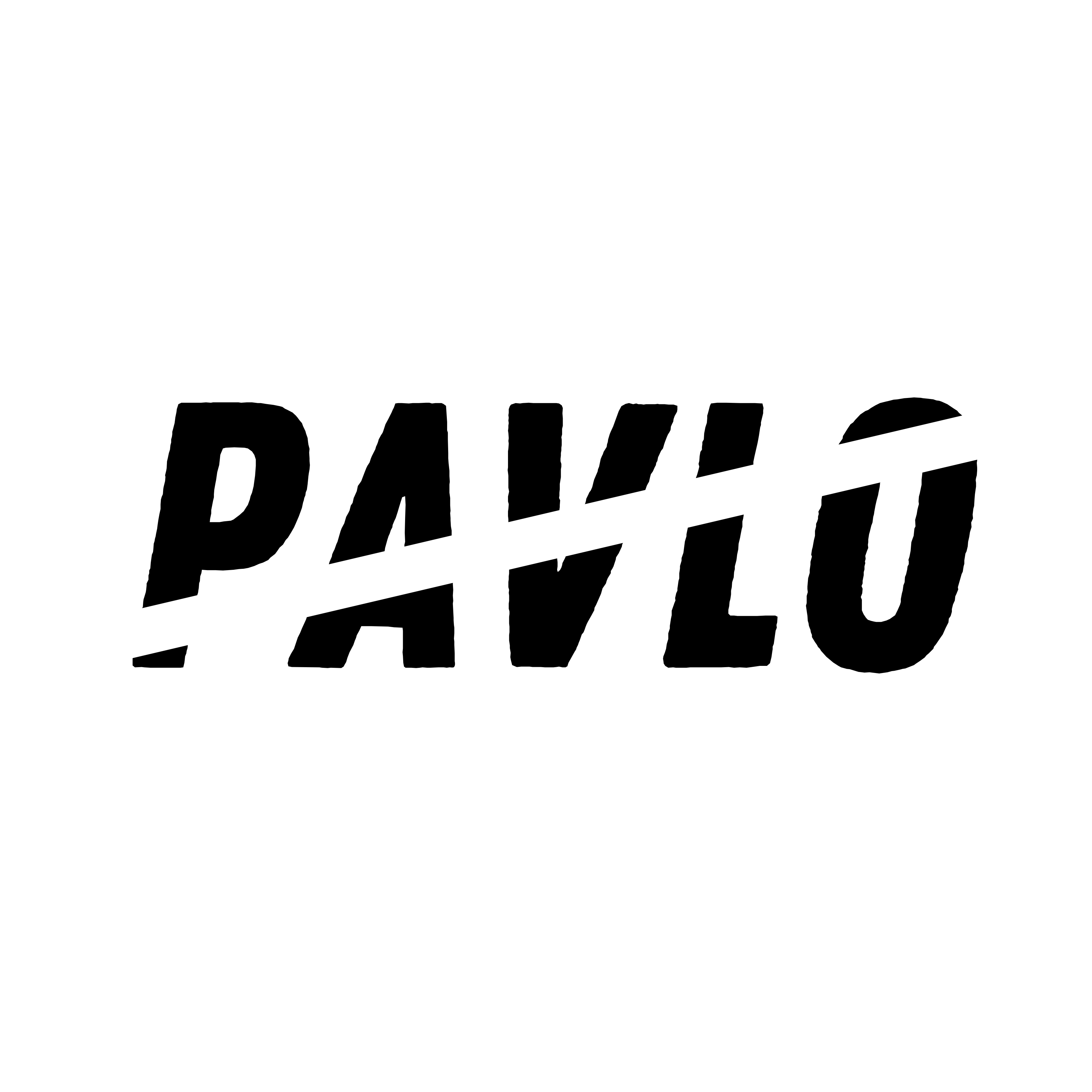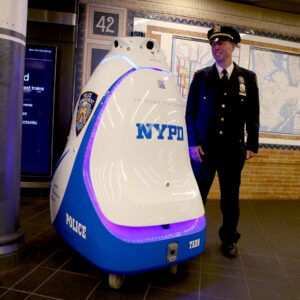

In 2021, NFT users doubled to about 550,000, and the market value of NFTs grew by 37,000%. NFTs are now an $11 billion USD industry and growing everyday.
So, are NFTs the next big monetization opportunity for creators and brands? Executives at most popular social media platforms seem to think so.
Meta recently expanded digital collectibles to 100+ countries on Instagram and Facebook, Twitter allows NFT profile pictures, TikTok experimented with selling NFTs, and Reddit just launched their own NFT marketplace.
Here’s everything you need to know about NFTs to take advantage of all the new features the social platforms are launching.
What is an NFT?
An NFT is a one-of-a-kind digital identification certificate that exists on a blockchain to verify authenticity and ownership of assets. NFT stands for Non-Fungible Token.
An NFT itself can be a digital item, or represent ownership of a physical object. Only one person can own a specific NFT at a time. Since NFT transactions take place on a secure blockchain, the ownership record cannot be copied or stolen.
They’re an important part of the movement toward Web3: A decentralized internet run on a blockchain where content and assets are securely controlled by individuals, not corporations.
How does an NFT work?
Think of an NFT as a famous painting. It’s sold many times over the years, but only one painting exists that changes hands. It’s a real item.
In other words: It’s non-fungible. Unfungible. The opposite of fungible. What a fun word, eh?
In investing terms, non-fungible means “irreplaceable.” A non-fungible asset cannot be easily or accurately replaced with another.
Cash? Totally fungible. You can trade a $20 bill for another and it’ll function the exact same.
Your car? Non-fungible. Sure, there are other cars in the world but they’re not exactly yours. They have different mileage, different wear-and-tear, and different fast food wrappers on the floor.
How to create an NFT
It’s easier than you think. To create and sell an NFT, you need 3 things:
- A blockchain wallet account that supports Ethereum (ETH): Popular options are MetaMask and Jaxx. You can create NFTs with other blockchains, like Polygon, but most marketplaces use Ethereum.
- Some ETH cryptocurrency (in your wallet).
- An NFT marketplace account: Popular options are OpenSea and Rarible, though there are many options.
OpenSea is very beginner friendly, so I’ll demo that.
1. Create an OpenSea account
Once you’ve set up a blockchain wallet, sign up for a free OpenSea account. Clicking any of the top navigation icons will ask you to connect your crypto wallet, which will create your account.
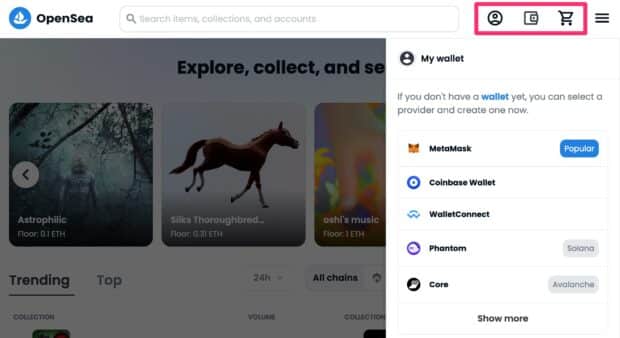
2. Connect your wallet
The process is slightly different for each wallet. Follow the prompts to connect your chosen crypto wallet. (I use MetaMask.)
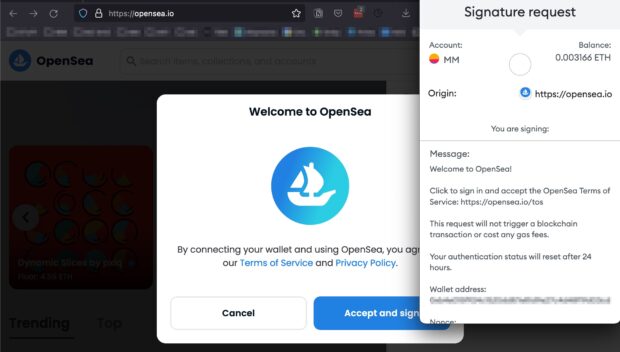
3. Create your NFT
Once you’ve linked your wallet and confirmed your account, go to Create. You’ll see a fairly straightforward form.
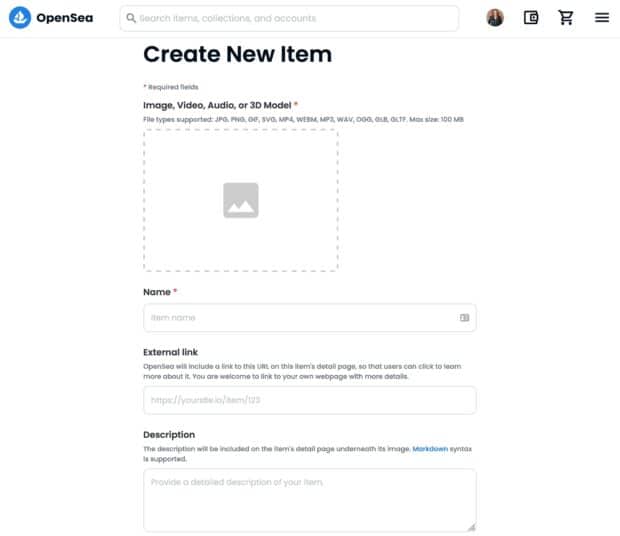
You need to have a digital thing to NFT-itize. It can be an image, video, song, podcast, or other asset. OpenSea limits the file size to 100mb, but you can link out to an externally hosted file if yours is larger.
Of course, it goes without saying that you need to own the intellectual property rights and copyright for whatever you want to sell, just like any other digital or physical product.
For this demo, I created a quick graphic.
The only mandatory fields are your file and a name. It’s that easy to get started.
Here’s a quick rundown of the optional fields:
- External link: Link to a higher-resolution or full version of the file, or a website with additional information. You can also link to your general website so buyers can learn about you.
- Description: Just like a product description on an ecommerce site. Explain your NFT, what makes it unique, and make people want to buy it.
- Collection: The category it appears in on your page. These are typically used to group variations of a series together.
- Properties: These are the attributes that make this NFT unique from others in your series or collection. Or, just more information about it.
For example, avatar NFTs usually list out what makes each avatar unique, such as eye color, hair, mood, etc.
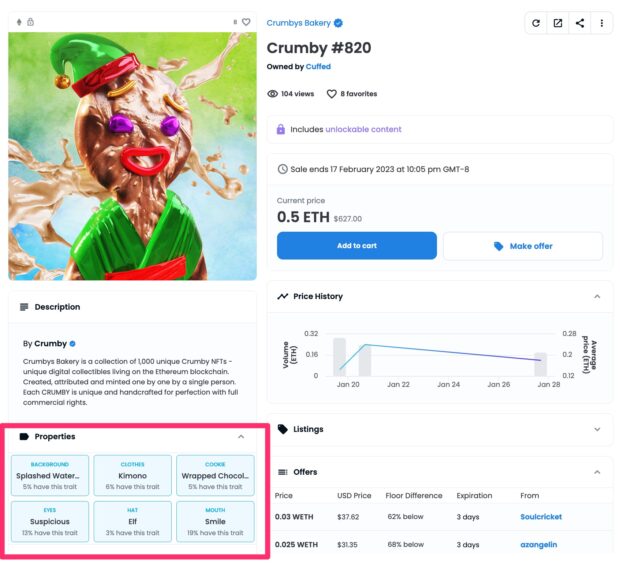
- Levels and stats: These are often used in the same way, but essentially these are properties ranked on a numerical scale instead of the text-based properties above. For example, how many editions or versions exist of the NFT.
- Unlockable content: A text box that is only viewable to the owner of the NFT. You can put markdown text here, including a link to a website or other file, instructions to redeem bonus material—whatever you want.
- Explicit content: Self explanatory. ?
- Supply: How many of this particular NFT will ever be available to buy. If set to 1, then only 1 will ever exist. If you want to sell multiple copies, you have to specify the total number here. This gets encoded in the blockchain with your NFT, so you can’t change it later.
- Blockchain: You can specify the blockchain you want to use to manage your NFT sales and records. OpenSea supports Ethereum or Polygon right now.
- Freeze metadata: After creating it, enabling this option moves your NFT data to decentralized file storage. This includes the NFT file itself, although doesn’t include any unlockable content. You will never be able to edit or remove your listing and it will exist forever.
Here’s my finished NFT:
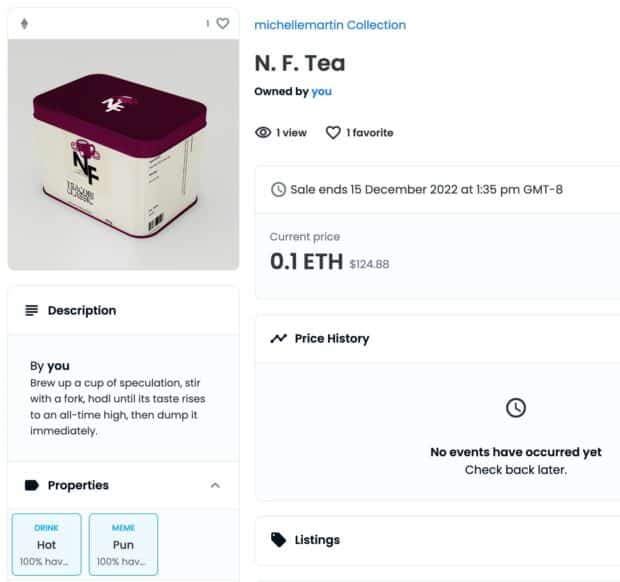
Now, this was a quick thing in order to do this demo (yay for learning together), so I don’t expect to be a millionaire overnight.
NFTs aren’t only for art, though. Here are other things you can sell as NFTs:
- Tickets to an event.
- An original song.
- An original film or documentary.
- An image, video, or audio file that comes with a bonus, such as a consultation, service, or other exclusive benefit.
- Ex-Twitter CEO Jack Dorsey even sold his first Tweet for $2.9 million.
How to buy NFTs
The exact process will vary depending on which marketplace you buy from, but here’s how to buy an NFT on OpenSea.
1. Sign up for OpenSea
If you haven’t already, sign up for OpenSea and connect your crypto wallet.
2. Find an NFT to buy
On the NFT’s detail page, you can read more about the item, what it is, and any special bonuses or things to know about it. For example, this NFT painting uses Artificial Intelligence to keep changing over time — forever. I don’t even know how that’s possible, but it sounds cool.
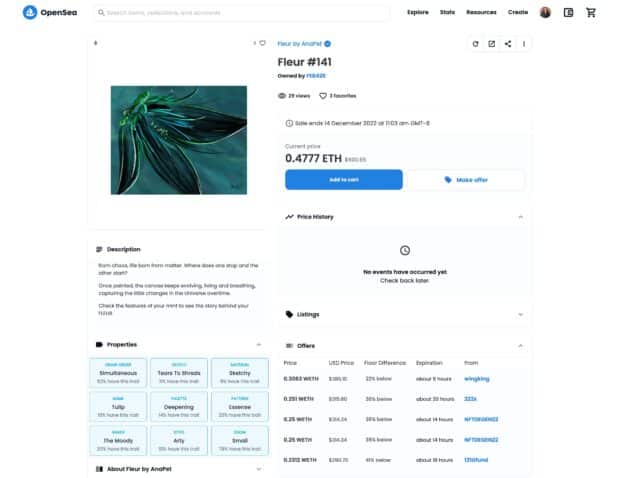
3. Add the correct amount of ETH to your wallet
Whether you’re going to pay full price or make an offer, you need currency to buy it. In this case, it’s Ethereum (ETH). Add enough to cover the purchase price to your crypto wallet.
You’ll also need a little bit extra to cover the “gas price.” Every blockchain transaction has a fee for processing the transaction, just like ecommerce payment processing fees. Gas prices fluctuate throughout the day depending on demand and other factors.
4. Buy it or make an offer
Just like eBay, you can make an offer which the seller may or may not accept, or if you really want it, buy it right away.
The sale currency is ETH, so for this NFT, offers are in WETH. It’s the same currency, although WETH is like pre-authorizing a credit card prior to a sale.
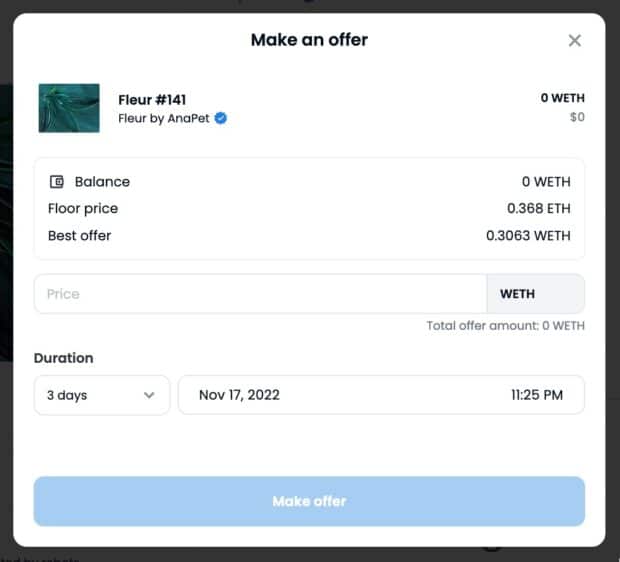
5. Show off your new NFT
NFTs you own will show up in your gallery at the marketplace or wallet they’re stored in:
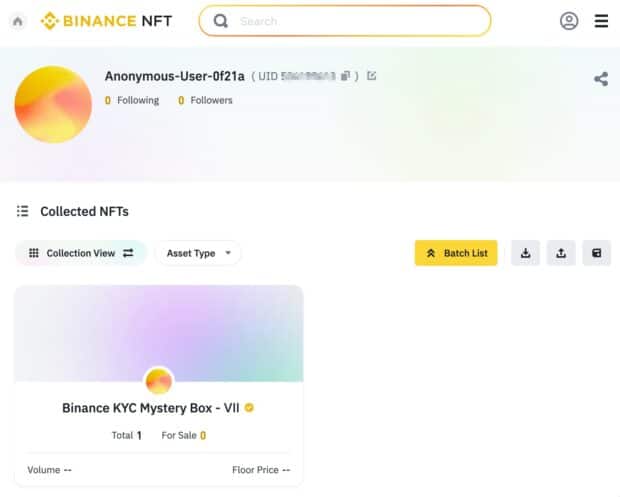
You can even buy monitors for your home, like Tokenframe, that connect to popular NFT wallets and display your NFT art collection.
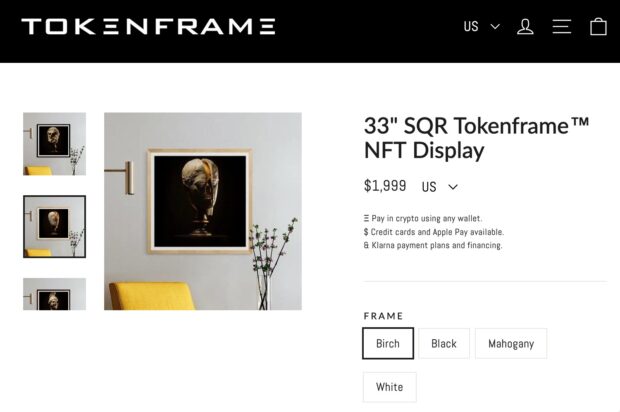
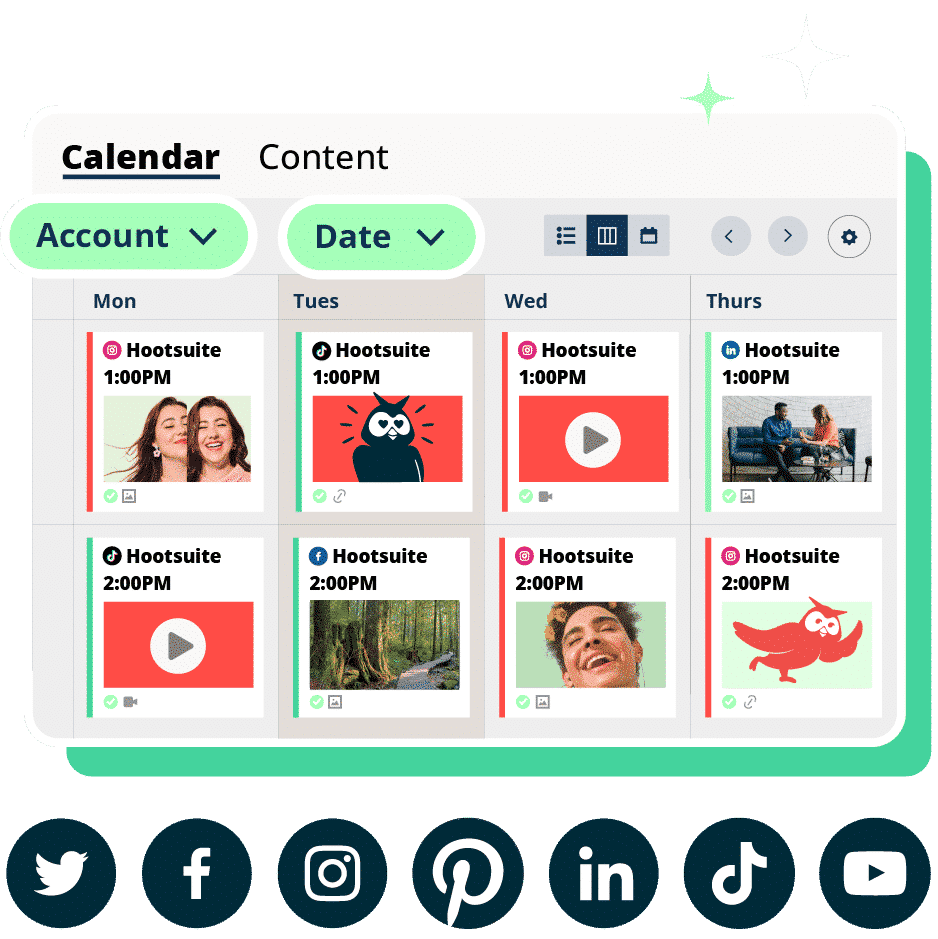
#1 Social Media Tool
Create. Schedule. Publish. Engage. Measure. Win.Free 30-Day Trial
Should you invest in NFTs?
I can see it now: The year is 2095. A Gen Y21K-er taps the neural interface over their ear. A holographic TV screen appears to binge 2024 reruns of Antique NFT Roadshow…
But seriously, investing in anything has risk and NFTs are no different. Do your own research and ensure you’re comfortable with words like “blockchain,” “stablecoin,” “DAO,” and other crypto jargon before diving in too deep.
Investing in NFTs could result in:
- Massive profit — like a really, really ridiculous 79,265% ROI in one year for an illustrated monkey. Bored Ape Yacht Club NFTs were “minted” (created) at a value of $189 USD in 2021 and the cheapest one is now worth $150,000 USD.
- Long-term financial appreciation.
- Discovering and supporting new artists.
- Being cool.
But, investing in NFTs could also result in:
- Losing some or all of an NFT’s value, as soon as overnight.
- An unbalanced overall portfolio if ignoring traditional assets in favor of NFTs.
- Losing all of your crypto assets, if the wallet or blockchain it’s stored on suddenly ceases to exist.
Frequently asked questions about NFTs
What is an NFT and how does it work?
An NFT (Non-Fungible Token) is a digital asset on a blockchain that certifies ownership of a digital item. Anything can be an NFT: Digital art, music, video content, and more. Each NFT represents one unique asset.
Why would anyone buy an NFT?
NFTs are a perfect investment for fans wanting to support their favorite artists, and for investors willing to take a risk for potentially high future returns.
In 2021, Kings of Leon became the first band to launch an album as an NFT collection which earned over $2 million USD. It included special NFT-only perks like front-row concert seats and an expanded version of the album.
How do you make money off NFTs?
If you’re a creator, you can make money off NFTs by selling your artwork. It’s competitive and not guaranteed, but this 12 year old has made $400,000 so far.
If you’re a collector or investor, NFTs work like any other high-risk but potentially high reward speculative investment, such as real estate.
What is the most expensive NFT ever sold?
Pak’s “The Merge” is the most expensive NFT ever sold at $91.8 million USD. It also holds the record for the most expensive piece of art ever sold by a living artist—including on our physical plane of existence.
What are NFTs used for?
NFTs are used as proof of ownership of digital assets, such as art, music, video, and other files. Since NFT transactions use blockchain technology, their records of ownership are 100% verified, thereby eliminating fraud. Buying an NFT is like signing an unbreakable smart contract.
What are some examples of Non-Fungible Tokens?
NFTs are digital tokens on a blockchain that are bought or sold to transfer ownership of a digital file, such as a piece of art, music, or video. NFTs can also represent physical items.
Can NFTs be fake?
Yes. NFTs verify ownership, but someone can still copy or steal the content inside, like any digital file. Scammers may try to sell those files as new NFTs.
To avoid scams, buy from reputable marketplaces, buy directly from an artist’s official website or verified marketplace account, and check the blockchain contract address before buying, which shows where the NFT was created.
Can I just draw something and make it an NFT?
Sure. An NFT is a digital asset, which can be an image file. Many artists sell digital paintings and illustrations on NFT markets.
However, many successful artistic NFTs use software or AI programs to create thousands of unique variations, such as the popular CryptoPunks collection.
How do you pronounce NFT?
Most people say it as it’s spelled: “En Eff Tee.” Just don’t call it a “nifty.”
